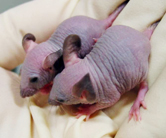28.05.2009
in HAIR LOSS SCIENCE

“A cure for baldness has come a step closer after scientists identified a gene that is connected to hair loss,” The Daily Telegraph has reported. Researchers blocked the activity of the Sox21 gene in mice and unexpectedly found that the mice started losing hair around two weeks after birth and had lost all their hair within a further week. The newspaper reported that this finding “should help scientists develop new treatments as well as help pinpoint early in life which men are likely to lose their hair”.

This study has found that if you remove the Sox21 gene from mice, their hair falls out. This does not necessarily mean that this gene plays a role in human baldness, and further studies are needed to determine whether this is actually the case.
However, this research does further our understanding of the biology of hair development and retention, and in this respect it may eventually play a part in the development of treatments to prevent or reverse hair loss. However, much more research would be needed before a “cure” for baldness becomes a reality.
Where did the story come from?
Dr Makoto Kiso and colleagues from the National Institute of Genetics and other research centres in Japan conducted this study. The research was funded by Solution-Oriented Research for Science and Technology, Japan Science and Technology Agency, and the Ministry of Education, Culture, Sports, Science and Technology, Japan. The study was published in the peer-reviewed scientific journal Proceedings of the National Academies of Science USA (PNAS).
What kind of scientific study was this?
This was an animal study looking at the role of the Sox21 gene in mice.
One method that scientists use to identify the functions of a particular gene is to stop that gene from working in mice and see what effect this has. The Sox21 protein (produced by the Sox21 gene) is capable of binding to DNA and is thought to help control whether the expression of specific genes is switched on or off in the cells.
Previous studies had suggested that the Sox21 gene plays a role in the development of nerve cells. Researchers in this study decided to identify the effects of Sox21 by genetically engineering mice to lack the gene. Once they had generated these mice, the researchers verified that the gene was completely inactive and then looked at the effects this had on their development.
The researchers found that hair development was affected, so they decided to look at normal mouse skin and human scalp tissue to see which cells in the skin and hair follicles the Sox21 gene was normally active in. They also examined samples of skin taken from Sox21-lacking mice and normal mice, looking at them under powerful microscopes (both scanning electron microscopes and transmission electron microscopes) to see whether there were any differences in the structure of their hair follicles. They also compared the activity of a number of genes in skin of both the normal and Sox21-lacking mice, including genes that are important for the development of hair.
What were the results of the study?
The researchers found that mice genetically engineered to lack the Sox21 gene started to lose their fur from 11 days after birth, and by about 20 to 25 days after birth they had lost all of their hair. The mice began to re-grow hair after a few days, but then lost it again. This cycle of hair loss and re-growth continued for at least two years in both male and female mice. These findings relating to hair loss were unexpected, as the Sox21 gene was not previously known to play a role in hair development.
The Sox21 gene was found to be active in normal mouse skin and in human scalp tissue, including in the outer layer of the hair shaft (called the cuticle layer) and also in the cells making new hair shaft cells, including cuticle cells. The researchers also found that mice lacking the Sox21 gene did not show the normal “interlocking” between the inner and outer layers of cuticle that anchors the hair shaft into the hair follicle.
When comparing gene activity between the Sox21-lacking mice and normal mice the researchers identified five genes that were more active and 114 genes that were less active in the skin of the genetically engineered mice. Many of the genes that were less active in Sox21-lacking mice were those that produced proteins involved with making the “scaffolding” of cells and that allowed cells to stick together. This included a number of keratin proteins produced in cuticle cells and found in the hair.
What interpretations did the researchers draw from these results?
The researchers conclude that the Sox21 gene plays a key role in controlling the development of the hair shaft cuticle and that this finding “shed[s] light on the possible causes of human hair disorders”.
What does the NHS Knowledge Service make of this study?
This research has shown that Sox21 is important for normal hair retention in mice and that the gene is also expressed in human hair follicles. However, while removing this gene in mice does cause their hair to fall out, this does not necessarily mean that this gene is a cause of human baldness. Further studies will be required to determine whether or not this is the case.
This study has furthered our understanding of the biology of hair retention, and it is possible that this research may one day lead to development of treatments to prevent or reverse hair loss.
However, Westminster Trichologist Gary Heron says, “treatments based on the results of this study remain some way off, and much more research is needed before a [ cure ]for baldness becomes a reality.”
http://www.nhs.uk/news/2009/05May/Pages/HairLossGeneBaldnessCure.aspx
When it’s time to see the Trichologist: If you begin losing hair rapidly, and or are cosmetically concerned about baldness, consult your Trichologist about treatment options. You can receive a free hair loss consultation with a Westminster Trichologist at our Hair Centre.
The point is that you are not getting to the real problem and you should seek specific professional advice from a Westminster Trichologist.
“Why buy hair loss treatments over the counter or on the internet when you can see a Westminster Trichologist for FREE and know that you are guaranteed results”
Do you have Hair Loss Problems, read our Hair Loss Help










